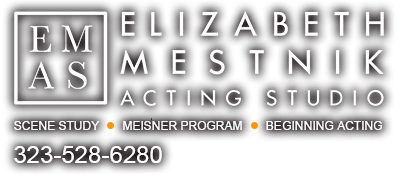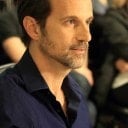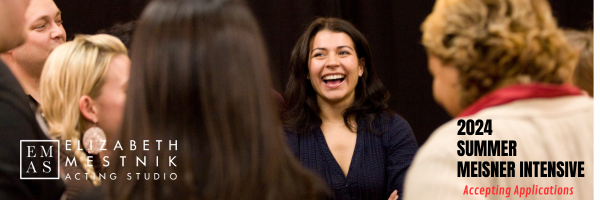Guest Post by Aisha Lomax
I needed to find a class. After spending almost three years at The Elizabeth Mestnik Acting Studio, (EMAS) (Summer intensive, two years of Meisner and scene study), it was time for something new. At least, that was what I had been told. All of the online acting forums informed me how imperative it was to not stay at the same studio for too long, lest I stop growing as an actor. I definitely didn’t want that to happen, so the search for a new Los Angeles acting class began.
This is what happened:
Class 1: The class started almost 30 minutes late, which was a red flag for me. The teacher was there, but a lot of the students weren’t, and the ones who were there didn’t seem to be in any rush to start class. They were chatting and playing around with one another and not ready to work. This was supposedly a “master” class, by the way. This studio used a hybrid of techniques, but the teacher really liked the Meisner repetition exercise. When he found out that I had studied Meisner, he invited me up to practice repetitions with the other students. Cool. I get up there and do the exercise with about five of the students. After about 15 minutes, I was exhausted and frustrated. Repetitions do that to you, but I was more upset by the fact that it was evident that the instructor hadn’t fully explained the point of the exercise so it went nowhere. Absolutely nowhere.
By the time that they were ready to put up the scenes, everyone seemed to check out, including the instructor. I decided to keep looking.
Class 2: Right away, the instructor informed the auditors that students don’t work every week. They only work when they are “ready”. What does that even mean? And who determines when the student is ready? Why would I pay my hard-earned money to maybe put up a scene once a month or so? Okay, I get it. There is a lot that can be learned from just observing and watching other actors work, but you mostly learn by doing. Final verdict: not for me.
Class 3: After doing research on their website, I discovered that that instructor didn’t allow audits. You had to have trust in the teacher and trust that he would be fantastic and that you would automatically jibe with his teaching style. Great.
These are only three examples of what I came across but, trust me, I could go on and on. Los Angeles is filled with dozens of acting classes, and I choose to believe that, for the most part, you will avoid situations like this. But, statistically speaking… well, you know, someone is filling those classes, I just didn’t want it to be me. I found myself back at EMAS one day watching the scene study class, the one I didn’t take because I thought I needed to “spread my wings”, wishing that I were on that stage, exploring a new character. And then the thing that Oprah calls an “ah-ha” moment hit me. I’d spent so much time and energy trying to find a studio to replicate what the Elizabeth Mestnik Acting Studio does so well, and it’s the reason why I decided to make EMAS my acting home in the first place.
Every single instructor has so much passion for what they do, and it’s refreshing and reassuring to walk into one of their classes knowing that fail or fly, you’re going to leave that class with a valuable piece of information to make your acting that much better. And the students are there to work. Elizabeth has fostered such a sense of community and family, and upon meeting the incredible teachers and students, you can’t deny it. It’s why I continue to go back for the mixers, staged readings and, realize that in the New Year, this is the place I need to be. Some people may truly need to change schools to get all the training they need for this industry, but that’s just not the case for me. Far from stunting my growth as an actor, I feel like I’ve found a creative home that challenges me and hones my process. I don’t really need to look any further.
 Aisha Lomax is a 2014 graduate of The Elizabeth Mestnik Acting Studio’s Professional Meisner Training Program. She is currently making strides in the commercial world; you can see her racing across town from one audition to the next!
Aisha Lomax is a 2014 graduate of The Elizabeth Mestnik Acting Studio’s Professional Meisner Training Program. She is currently making strides in the commercial world; you can see her racing across town from one audition to the next!


 Ken Weiler
Ken Weiler 






